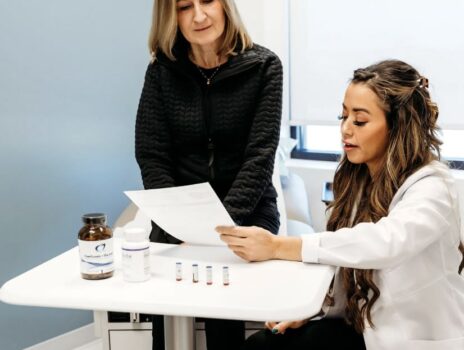As we age, our bodies naturally experience changes that impact energy levels, mood, and even libido. Factors like chronic stress, certain health conditions, and psychological challenges, such as past trauma, can further reduce libido over time. Although hormonal fluctuations are common, a prolonged decline in libido can harm relationships, self-esteem, and overall well-being. Many individuals mistakenly believe that a diminishing libido is an inevitable part of aging—but it doesn’t have to be. Bioidentical Hormone Replacement Therapy (BHRT) offers a safe, proven solution for restoring hormonal balance, boosting vitality, and enhancing a fulfilling, intimate life.
Understanding Libido and Sex Hormones
Libido is a complex interaction of physical, emotional, and hormonal factors. Key hormones play a central role in regulating sexual desire, including:
– Estrogen: In women, estrogen is crucial for sexual health, supporting natural lubrication, arousal, and overall satisfaction. Low estrogen levels, common in menopause, can reduce interest in intimacy and lead to discomfort.
– Testosterone: Known as the “libido hormone,” testosterone is essential for both men and women, influencing desire, energy, and mood. A gradual decline in testosterone can lead to low libido, fatigue, and decreased motivation.
– Progesterone: This hormone helps balance estrogen levels and promotes relaxation, contributing to emotional wellbeing, which is essential for a healthy libido.
Factors Affecting Sexual Health
Sexual health is influenced by a complex interplay of physical, emotional, and psychological factors. Understanding these elements can help you take proactive steps to maintain a healthy sex life.
- Hormonal Imbalances: Changes in sex hormones, such as testosterone and estrogen, can significantly impact sexual desire and function. These hormones play a crucial role in regulating libido, and imbalances can lead to decreased sexual interest and performance. Hormonal changes throughout the menstrual cycle can also influence sexual behavior, affecting sexual desire and response.
- Mental Health: Conditions like depression, anxiety, and chronic stress can negatively affect sexual health. Mental health issues can reduce your desire for sex and make it challenging to enjoy sexual activities.
- Physical Health: Chronic illnesses, such as diabetes and heart disease, can impair sexual function and desire. These conditions can affect blood flow, energy levels, and overall physical well-being, all of which are essential for a healthy sex life.
- Medications: Certain medications, including antidepressants and blood pressure medications, can impact sexual function and desire. If you notice changes in your libido after starting a new medication, it’s important to discuss this with your healthcare provider.
- Lifestyle Factors: Smoking, excessive alcohol consumption, and lack of exercise can negatively impact sexual health. Adopting a healthier lifestyle can improve your overall well-being and enhance your sexual function.
- Relationship Issues: Problems in relationships, such as communication issues and intimacy concerns, can affect sexual health. Building a strong emotional connection and addressing any relationship problems can help improve your sex life.
Symptoms and Causes of Low Libido
Low libido, also known as hypoactive sexual desire disorder (HSDD), is a common condition characterized by a lack of interest in sex. Recognizing the symptoms and understanding the causes can help you seek appropriate treatment.
Symptoms of Low Libido:
- Decreased interest in sex
- Difficulty becoming aroused
- Difficulty achieving orgasm
- Avoiding sex due to lack of interest
Why Low Libido Declines with Age
Aging can disrupt this delicate hormonal balance. For women, menopause brings a significant decrease in estrogen and progesterone, often leading to a drop in sex drive. Men, on the other hand, experience a more gradual decline in testosterone, starting as early as their 30s. Other factors, like chronic stress, poor sleep, and an imbalanced diet, can further affect hormone production, compounding the impact on libido.
How BHRT Can Help
Bioidentical Hormone Replacement Therapy (BHRT) offers a personalized approach to restoring hormone balance. BHRT uses hormones that are molecularly identical to those naturally produced by the body, which makes it both effective and well-tolerated. Here’s how BHRT can revitalize your libido:
BHRT can help address various psychological and physical factors influencing sexual desires, including hormonal changes and mental health issues.
- Restoring Balance: BHRT helps restore levels of estrogen, testosterone, and progesterone, addressing the root cause of decreased libido rather than masking symptoms.
- Enhancing Energy and Mood: When hormones are balanced, patients often experience improved energy levels, mood stability, and reduced anxiety, all of which can positively impact sexual desire and satisfaction.
- Improving Physical Comfort: For women experiencing discomfort from low estrogen, BHRT can help restore natural lubrication and reduce symptoms like vaginal dryness, making intimacy more comfortable and enjoyable.
- Supporting Overall Wellness: BHRT is part of a holistic approach to health, supporting longevity, mental clarity, and physical vitality.
BHRT for Both Men and Women
BHRT isn’t just for women! Men experiencing a drop in testosterone may notice fatigue, reduced muscle mass, mood swings, and a drop in libido. BHRT offers men a natural, safe way to boost testosterone levels, which can reignite their desire and improve their quality of life.
What to Expect on Your BHRT Journey
1. Initial Consultation: We’ll begin with a thorough consultation to understand your symptoms, health history, and goals.
2. Comprehensive Testing: Through blood work and possibly other testing, we’ll assess your hormone levels to identify any imbalances.
3. Personalized Treatment Plan: Based on your results, we’ll create a BHRT plan tailored to your needs, ensuring you receive the correct hormones in the right amounts.
4. Ongoing Support and Adjustments: Hormones can change over time, so we’ll monitor your progress and make adjustments to keep you feeling your best.
Treating Low Libido with Lifestyle Changes
Lifestyle changes can play a significant role in treating low libido. By incorporating healthy habits and making conscious choices, individuals can improve their overall sexual health and increase their sex drive. Here are some lifestyle changes that can help:
- Regular Exercise: Engaging in regular physical activity can help improve libido by increasing blood flow, reducing stress, and boosting mood. Activities like yoga, swimming, and walking can be particularly beneficial. Exercise not only enhances physical health but also supports mental well-being, both of which are crucial for a healthy sex drive.
- Healthy Diet: Eating a balanced diet rich in fruits, vegetables, whole grains, and lean proteins can help support sexual health. Foods high in antioxidants, such as berries and leafy greens, can also help improve libido. Nutrient-dense foods provide the essential vitamins and minerals needed for optimal hormone production and sexual function.
- Stress Management: High levels of stress can negatively impact libido. Practicing stress-reducing techniques like meditation, deep breathing, or mindfulness can help alleviate stress and improve sexual function. Finding effective ways to manage stress can lead to a more relaxed state of mind, which is conducive to a healthy sex life.
- Sleep and Relaxation: Getting adequate sleep and engaging in relaxing activities, such as reading or taking a warm bath, can help improve libido and overall sexual health. Quality sleep is essential for hormone regulation and energy levels, both of which affect sex drive.
- Communication and Intimacy: Nurturing emotional intimacy and communication with one’s partner can help improve libido and overall sexual satisfaction. Open and honest communication about desires and concerns can strengthen the emotional bond and enhance sexual experiences.
By incorporating these lifestyle changes, individuals can take a proactive approach to improving their libido and overall sexual health. Small, consistent efforts in these areas can lead to significant improvements in sexual function and satisfaction.
Behavioral Therapy for Low Libido
Behavioral therapy, also known as sex therapy, can be an effective treatment for low libido. This therapeutic approach helps individuals and couples address underlying issues that may be contributing to decreased sexual desire.
Key Areas Addressed in Sex Therapy:
- Communication Issues: Sex therapy can help individuals and couples improve communication and intimacy. Open and honest communication is essential for a healthy sex life.
- Intimacy Concerns: Sex therapy can help individuals and couples address intimacy concerns and improve emotional connection. Building a strong emotional bond can enhance sexual desire and satisfaction.
- Sexual Dysfunction: Sex therapy can help individuals and couples address sexual dysfunction, such as erectile dysfunction and premature ejaculation. Addressing these issues can improve overall sexual function and satisfaction.
Common Techniques Used in Sex Therapy:
- Sensate Focus: This technique involves focusing on sensual touch and intimacy, rather than intercourse. It helps individuals and couples reconnect and build intimacy without the pressure of sexual performance.
- Cognitive-Behavioral Therapy: This technique involves identifying and challenging negative thought patterns and behaviors that may be contributing to low libido. Changing these patterns can improve sexual desire and function.
- Mindfulness-Based Therapy: This technique involves using mindfulness techniques, such as meditation and deep breathing, to improve emotional connection and intimacy. Mindfulness can help individuals and couples be more present and engaged during sexual activities.
Medications and Supplements for Low Libido
There are several medications and supplements that can help improve low libido. These treatments can address hormonal imbalances and enhance sexual function.
Common Medications:
- Hormone Replacement Therapy: This treatment involves replacing hormones, such as testosterone and estrogen, to improve sexual desire and function. BHRT is a personalized approach that can effectively address hormonal imbalances.
- Phosphodiesterase Inhibitors: Medications like sildenafil (Viagra) and tadalafil (Cialis) can help improve erectile function and increase libido. These medications enhance blood flow to the genital area, supporting sexual function.
- Selective Serotonin Reuptake Inhibitors (SSRIs): Medications such as fluoxetine (Prozac) can help improve mood and reduce symptoms of depression, which can impact libido. Managing mental health can positively affect sexual desire.
- Flibanserin (Addyi): Approved for premenopausal women with hypoactive sexual desire disorder (HSDD). Acts on serotonin receptors in the brain but may cause side effects like dizziness or fatigue.
- Bremelanotide (Vyleesi): A newer injectable option approved for premenopausal women with HSDD. Works on melanocortin receptors in the brain to increase sexual desire.
- Bupropion (Wellbutrin): An atypical antidepressant often used off-label to address sexual dysfunction, especially for those experiencing libido loss from other antidepressants.
Common Supplements:
- Testosterone Supplements: These supplements can help improve testosterone levels, which can impact libido. They are often used to address low testosterone levels in both men and women.
- DHEA (Dehydroepiandrosterone): This adrenal hormone can convert to testosterone and estrogen in the body. Supplementing low levels has shown some promise in improving libido, especially in older adults.,
- Tribulus Terrestris: A herb that may help with libido and, potentially, support testosterone, though effects can vary widely.
- Panax Ginseng (Korean Red Ginseng): Often used for men, with some evidence suggesting it can enhance libido and erectile function.
- Maca Root: This supplement is believed to improve libido and sexual function. Maca root is a natural remedy that has been used for centuries to enhance sexual health.
- Horny Goat Weed: This supplement is believed to improve libido and sexual function. It is a popular herbal remedy known for its potential benefits in enhancing sexual desire.
The Importance of a Healthy Sex Life
A healthy sex life is essential for overall health and well-being. Engaging in regular sexual activity can have numerous benefits for both your physical and mental health.
Benefits of a Healthy Sex Life:
- Improved Mental Health: Sex can help reduce stress and anxiety and improve mood. The release of endorphins during sexual activity can enhance your overall sense of well-being.
- Improved Physical Health: Sex can help improve cardiovascular health, reduce pain, and improve sleep. Regular sexual activity can be a form of physical exercise that benefits your heart and muscles.
- Improved Relationships: Sex can help improve intimacy and emotional connection in relationships. A healthy sex life can strengthen the bond between partners and enhance relationship satisfaction.
- Improved Self-Esteem: Sex can help improve self-esteem and body image. Feeling desired and connected with your partner can boost your confidence and self-worth.
Seeking Medical Attention for Low Libido
If you are experiencing low libido, it is essential to seek medical attention. A healthcare provider can help diagnose underlying causes of low libido and recommend treatment options.
Signs You May Need to Seek Medical Attention:
- Persistent lack of interest in sex
- Difficulty becoming aroused
- Difficulty achieving orgasm
- Avoiding sex due to lack of interest
A healthcare provider can help you address underlying issues and improve your overall sexual health. They can offer personalized treatment plans, including BHRT, medications, supplements, and behavioral therapy, to help you reclaim your vitality and enjoy a fulfilling sex life.
Other Lifestyle Tips to Support Sexual Health
While BHRT can be a game-changer, lifestyle adjustments are also essential for supporting libido:
Regular exercise, stress management, and a balanced diet can positively affect sex drive and overall sexual health.
- Stay Active: Regular exercise improves circulation, boosts mood, and enhances energy, all of which can support a healthy libido.
- Manage Stress: Chronic stress disrupts hormone production and can lower libido. Mindfulness practices, yoga, and adequate sleep are powerful tools for stress management.
- Nourish Your Body: A balanced diet rich in lean proteins, healthy fats, and antioxidants can promote hormone health and boost energy levels.
Reclaiming Your Sex Drive with BHRT
There’s no need to accept a diminishing libido as part of getting older. With BHRT, you can reclaim your vitality, reignite your passion, and feel empowered in every aspect of life. At Yoo Direct Health, we’re dedicated to helping patients achieve optimal health and happiness, supporting you through every step of your wellness journey. Whether you’re just noticing symptoms or have been struggling for a while, BHRT offers a safe, natural path to a more fulfilling life.
Ready to start your journey? Book a consultation with Yoo Direct Health and take the first step toward rediscovering your vitality.
Conclusion
Low libido can be a complex issue, influenced by a variety of factors, including physical health, mental health, and lifestyle choices. By understanding the causes of low libido and exploring treatment options, individuals can take steps to improve their sexual health and overall well-being. Whether through lifestyle changes, medical treatment, or therapy, there are many ways to address low libido and improve one’s sex life.
Prioritizing sexual health is essential for a fulfilling and satisfying sex life. By seeking support when needed and making informed choices, individuals can reclaim their vitality and enjoy a more vibrant intimate life. Remember, you don’t have to accept low libido as an inevitable part of aging. With the right approach, you can enhance your sexual health and overall quality of life.
Learn more on The Better Yoo Project Podcast!


